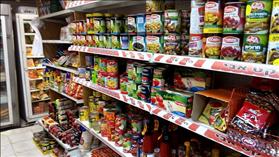Religious political parties vow to reverse the Court's ruling via legislation
Supreme Court: Tel Aviv mini-markets may operate on Shabbat
Israel's High Court of Justice ruled on Wednesday in favor of Tel Aviv’s battle to expand facilities open to the secular public on Shabbat, saying that the municipality can permit mini-markets to operate on the Jewish day of rest.
20/04/2017 15:30
Tags: Shabbat · Supreme Court · Tel Aviv · Jewish Home · Shas · United Torah Judaism

Israeli mini-market, source: Wikipedia
In recent months, Hiddush has highlighted the Supreme Court’s crucial role in Israeli society many times. The political system consistently bends over backwards to secure the religious political parties’ votes, against the overwhelming will of the Israeli public; and the Knesset Opposition parties avoid challenging the government’s coercive religious policies, hoping to curry favor with the ultra-Orthodox parties and replace PM Netanyahu’s government.
Only Israel’s independent civil Court proves to be the source of remedy and progress within the government. Of course, this must not misdirect us from appreciating the potential impact that American Jewish leadership can have upon Israel’s religion-state arena, as was evidenced in Israel’s historic battles over “Who is a Jew” and the campaign to free Soviet Jewry.
This week, we return to underscore the Supreme Court’s role because the significance of the ongoing religion-state conflict and the importance of Israel’s independent judiciary cannot be exaggerated.
Most recently, the High Court of Justice on Wednesday ruled in favor of Tel Aviv’s battle to expand facilities open to the secular public on Shabbat, saying that the municipality can permit mini-markets to operate on the Jewish day of rest. The ruling was hailed as a victory by the city, as an important step against religious coercion. After the ruling was announced in the afternoon, Hiddush projected that the Court would once again be viciously assaulted by the ultra-Orthodox political parties. As always, they didn’t disappoint us. Here are some prime examples:
Minister of Health Rabbi Yaakov Litzman pronounced: "The High Court's decision is a severe blow to the Jewish Shabbat and the Jewish character of the State of Israel. This is a continuation of the courts' gross intervention into the values of religion and Jewish law, which has no obvious solution other than the advancement of a law [through the Knesset] to prevent further erosion of Israel's tradition and religion."
Knesset Finance Committee Chairman MK Rabbi Moshe Gafni responded: "This is a miserable decision, and the Supreme Court Justices are unaware of Shabbat's value... they will [learn] respect and sit in their place. This is a breach of the status quo; we will not permit this; we will not remain silent. We will turn to the Prime Minister to urgently convene the Coalition leaders to solve the problem created by the High Court Justices."
This is like the Kremlin's rule, and it is a shame that the shaky, cowardly Knesset does not enact a law to invalidate [such] a ruling, which negates the legislature's intent, as per the Justices' personal agenda.
Knesset Ombudsman's Committee Chairman MK Yisrael Eichler said: "This is like the Kremlin's rule, and it is a shame that the shaky, cowardly Knesset does not enact a law to invalidate [such] a ruling, which negates the legislature's intent, as per the Justices' personal agenda. A Jewish state must respect Shabbat, and a democratic state must respect the law. The High Court of Justices does not respect Shabbat, nor the law."
In stressing the religious political parties' ultimatum to pass a law that would overturn the Supreme Court ruling, a senior leader of UTJ that preferred to remain anonymous said, "we'll go to the very end over this law. If the government puts obstacles in the way, we'll bring it down."
As it turns out, it isn't only the ultra-Orthodox political parties, but also the Zionist Orthodox Jewish Home party, that is demanding that the Court ruling be overturned via legislation. The ultra-Orthodox leaders have no respect for the independent civil judiciary as a matter of principle, but now Jewish Home party Chairman Naftali Bennett has also expressed his adamant refusal to accept the balance recommended by the Supreme Court, which attempts to maintain both respect for Shabbat and a limited availability of convenience stores in the city. In a joint letter from the heads of the Jewish Home party, Shas and United Torah Judaism, they demand that the Prime Minister intervene immediately and correct the court's ruling regarding the opening of the supermarkets on the Sabbath: “We will not be partners in harming and trampling the honor of Shabbat.”
In reality, the High Court of Justice acted in a balanced, responsible way, once again heeding the will of the overwhelming majority of the Israeli public, the core values of freedom of religion and conscience, as well as a profound respect for the Jewish Shabbat. According to Hiddush's recent public opinion polling, 78% of Jewish Israelis support permitting Tel Aviv's convenience stores and minimarkets to remain open on Shabbat.
All proponents of democracy should welcome the Court's decision, which emphasizes the will of the local citizenry, and views this as a proper expression of Israel's identity as a "Jewish and democratic" state. The Court once again exposed the Government and Interior Minister Deri who aimed in their usual manner to stall for time and refrain from allowing the municipality any flexibility over its local Shabbat balance. We may only hope that the government will draw a lesson from this and cease its religious coercion over local authorities. This ruling reflects the desire of a decisive majority of the public, rather than that of a minority, which wishes to impose its extremist religious views upon all of Israel. However, there is great concern that political pressure will be exerted upon the Supreme Court, in an effort to trample its authority and limit its independence.